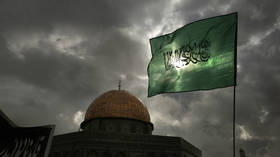The UK’s Hamas ban shows what it really thinks of a two-state solution
Robert Inlakesh is a political analyst, journalist and documentary filmmaker currently based in London, UK. He has reported from and lived in the occupied Palestinian territories and currently works with Quds News and Press TV. Director of ‘Steal of the Century: Trump's Palestine-Israel Catastrophe’. Follow him on Twitter @falasteen47

An announcement by Home Secretary Priti Patel that she will put to Parliament that the political wing of Hamas be proscribed a terrorist group has sparked outrage among Palestinians, and received great public support from Israelis.
Hamas is a Palestinian political party that currently governs the besieged Gaza Strip. Its armed wing – the Izz ad-Din al-Qassam Brigades – had been proscribed as a terrorist organisation in 2001, but until now the UK authorities had held off from considering the entire organisation as such.
In 2019, the UK also proscribed the political wing of Lebanese Hezbollah as a terrorist group, using the Terrorism Act of 2000 now being utilised by Patel to fastrack the process for Hamas. The notion will be put to Parliament, debated and by November 26, the home secretary hopes to have it passed.
While Patel argues the decision to imprison those who fly a Hamas flag for up to 14 years comes due to the “fundamentally and rabidly anti-Semitic” nature of the Hamas movement, as she calls it, in reality it has nothing to do with this.
Patel claims that the move is based on making Jewish people feel safer, and an apparent sudden realisation that the political and military wing are indistinguishable. However, the reality is that Israeli officials had just weeks earlier urged their British counterparts to take the step and Patel – who had to resign from the British cabinet in 2017 over an unannounced trip to Israel and meeting with Knesset members – is simply falling into line for an ally who sought a favour.
The ally, of course, is the same Israeli government who last month banned six Palestinian human rights groups as terrorist organisations, claiming it had hard evidence that they were funding a “terrorist group”. UN agencies condemned the move, and the so-called hard evidence presented to the European Union as proof of its claims was rejected.
What does this move to ban Hamas mean in reality? Well, other than tough punishments for those deemed to support the group, it seems the UK is shooting itself in the foot politically. If the point really is to make Jewish people feel safer, she should have pushed for a specific anti-Semitism bill. But taking a major political decision based on the completely separate issue of terrorism is immature and strange – like claiming Isaac Newton was a racist slave trader, so we should now reject the idea of gravity. In addition, the amount of people in the UK who even support Hamas is barely measurable.
Israeli media outlets have claimed that “significant” fundraising for Hamas goes on in the UK and so the move will represent a large blow to the organisation, but there is no evidence to support this line of thinking. No one is out there openly raising money for Hamas in Britain and there’s no suggestion anyone is doing it in private either. To get any funding to Palestinians in Gaza is a struggle in itself – just sending a book to a friend of mine there took over a year. Sending money to Hamas is no simple task, and the group receives most of its funds from Qatar and Iran.
Hamas was democratically elected to power in Gaza in the Palestinian Authority (PA)’s 2006 legislative elections, winning in a landslide. Following an attempted coup, led by Mohammed Dahlan of Fatah – the main opposition – Hamas took full control of the strip. The territory, labelled an open-air “prison” by former British prime minister David Cameron, was placed under a military siege by Israel and since 2006, the PA’s president, Mahmoud Abbas, has cancelled all elections there, despite Hamas’ desire for them to be held.
Hamas has never launched terrorist attacks against the UK, nor has it ever vowed to do so, and poses no risk to British citizens. It is the single largest Palestinian political party inside the occupied territories, and has a much larger support base than rival Fatah. The decision to proscribe the political wing of Hamas only really does one thing – it shows that the UK is taking steps to close the door on the most popular Palestinian political movement that participates in democratic processes.
The UK government has adopted the popular policy position, shared by over 100 UN member states, which asserts that a ‘two-state solution’ is what it supports to bring about to end the Palestine-Israel conflict. For some time, the British authorities have adopted a position of boycotting talks with the political wing of Hamas, whilst Hamas has remained open to dialogue.
If a two-state solution is to be agreed upon, then all those involved in making it come about must engage with the Palestinian side. The only Palestinians that the UK will now be open to discussions with are the Palestinian Authority figureheads, who they fund in order to prop them up.
The PA’s leadership has little support beyond a small group of loyalists and those on its payroll, and they do not represent the Palestinian people, cancelling democratic elections for fear of their inevitable loss. Even if a two-state solution was presented and accepted by the PA, Hamas is such a large force that it would have to be consulted.
If elections are eventually held in the occupied territories, it seems almost guaranteed that Hamas would win in a landslide, so what then? This would mean that the PA would be led by Hamas and the British government would have no contact with the official representative body of the Palestinians. If any talks to de-escalate violence were to take place, for example, the UK could no longer play a role.
Perhaps the most important point here is that the Israeli government that Patel is making this move to please is led by a prime minister, Naftali Bennet, who will not accept a Palestinian state and believes the West Bank was granted to Israel by the bible.
So for the UK government to say it supports a solution for both sides is completely wrong. It is siding with an Israeli government opposed to a two-state solution, against a party – Hamas – which accepts it.
The statements, views and opinions expressed in this column are solely those of the author and do not necessarily represent those of RT.


0 Comments:
Post a Comment
Subscribe to Post Comments [Atom]
<< Home